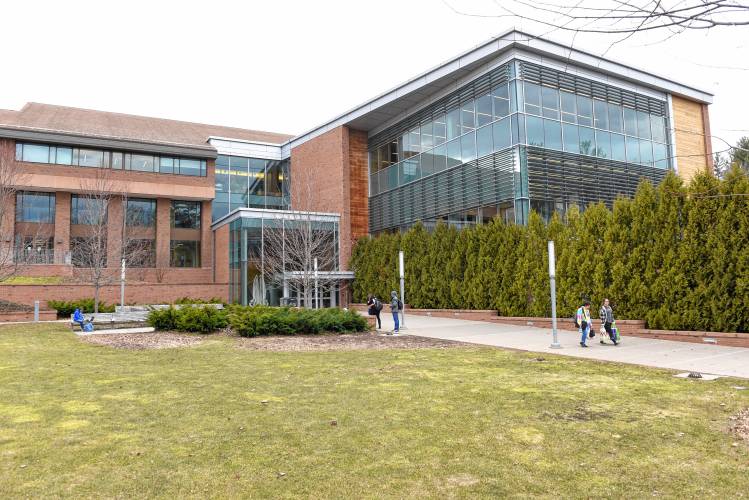My Turn: Restoring the promise of Massachusetts’ community colleges
| Published: 12-12-2023 6:15 AM |
The promise of Massachusetts’ community colleges is high quality, affordable education that’s accessible to everyone. At Greenfield Community College, where I’m a professor, our goal is to ensure there’s opportunity available for all residents, regardless of age, race, or economic status.
Many of our students are juggling the responsibilities of caregiving and work. Most are financially responsible for themselves and loved ones. Often they’re among the first in their families to seek a degree.
I’ve seen firsthand the transformation one person’s journey in community college can have not only for them but their entire family. One of my first-generation college students shared with her parents how the confidence she gained in my class helped her believe in herself as she entered this new phase in her life.
Her mother was so inspired that she got her high school equivalency and she then enrolled in my class, and her father did the same the following semester. Education has the power to change families, helping both students and parents discover the potential they didn’t realize they had, inspiring them to pursue new career opportunities, and transforming their lives for the better. This is how we lift up and strengthen our communities.
The Massachusetts Legislature now has the unique ability to help reach that goal and expand opportunity by passing the CHERISH Act, which would not only help students of all backgrounds to graduate from a public college or university debt-free, but also tackle economic, social and racial equity gaps. It goes beyond education, aiming to meet our state’s climate change goals, create high-quality workplaces, and foster a competitive workforce essential to our state’s economy.
The commitment to debt-free public higher education is a centerpiece of this bill. The weight of student debt is a significant barrier for far too many students, especially for those from lower-income families. By establishing debt-free public higher education, the act paves the way for a more equitable public education system, ensuring that students can focus on their studies without the crushing burden of debt looming over their future.
Another critical aspect of the legislation is its focus on providing resources for much-needed student supports. Specializing in developmental math, I am acutely aware of the need for additional student support services. Many students in developmental courses require extra assistance, yet our colleges often lack the resources to provide adequate support.
The CHERISH Act allocates funds to address this issue, allowing students to access the services they need to succeed academically. Whether it’s additional counseling, learning specialists or targeted support programs, these investments will undoubtedly enhance the overall educational experience for students.
Article continues after...
Yesterday's Most Read Articles
 Retired police officer, veteran opens firearms training academy in Millers Falls
Retired police officer, veteran opens firearms training academy in Millers Falls
 UMass graduation speaker Colson Whitehead pulls out over quashed campus protest
UMass graduation speaker Colson Whitehead pulls out over quashed campus protest
 As I See It: Between Israel and Palestine: Which side should we be on, and why?
As I See It: Between Israel and Palestine: Which side should we be on, and why?
 Real Estate Transactions: May 10, 2024
Real Estate Transactions: May 10, 2024
 Baseball: Caleb Thomas pitches Greenfield to first win over Frontier since 2019 (PHOTOS)
Baseball: Caleb Thomas pitches Greenfield to first win over Frontier since 2019 (PHOTOS)
 High Schools: Greenfield softball squeaks out 1-0 win over Franklin Tech in pitchers duel between Paulin, Gilbert
High Schools: Greenfield softball squeaks out 1-0 win over Franklin Tech in pitchers duel between Paulin, Gilbert
The CHERISH Act will help our school and other public institutions to keep their educators by expanding eligibility for state health care and retirement benefits for adjunct faculty and part-time staff. It acknowledges the vital role played by these educators and seeks to provide them with the necessary support and recognition. The CHERISH Act will help to attract and retain the talented pool of educators to train the next generation of students.
The CHERISH Act also tackles the issue of aging and neglected infrastructure on college campuses. While the repair of buildings may seem less compelling in comparison, the safety and functionality of these spaces significantly impact both faculty and students as well as the environment. Adequately funded institutions can provide a more conducive learning environment and modernize our buildings to be more efficient.
But there’s another reason the investment in campus infrastructure is important. Decades of funding cuts to capital projects have been a quiet but insidious reason why even public college has become so out-of-reach for too many families. When the burden of construction costs is overwhelmingly put on public colleges and no longer funded through the state budget, schools are forced to take on debt and this in turn incentivizes large hikes to tuition and student fees.
The result is that our state’s higher education becomes even more unaffordable. With the CHERISH Act, the state can adequately fund and maintain our public college and university buildings without passing on the cost to students through higher tuition and exorbitant fees.
Strengthening public higher education is one of the very best investments in our collective future. By addressing the needs of adjunct faculty, relieving students of crippling debt, and improving campus infrastructure, lawmakers can make good on the promise of our public higher education system. It’s time for Massachusetts to prioritize the education of its citizens. Passing the CHERISH Act is a crucial step in the right direction.
Phyllis Keenan is a professor at Greenfield Community College.



 From Global to Local: Mother’s Day and peace, 2024
From Global to Local: Mother’s Day and peace, 2024 My Turn: Valuing the grave work of funeral service providers
My Turn: Valuing the grave work of funeral service providers Martha Jorz: Stop supporting UMass and Raytheon
Martha Jorz: Stop supporting UMass and Raytheon Erik Hoffner: Solar panels not a good use of farmland
Erik Hoffner: Solar panels not a good use of farmland
